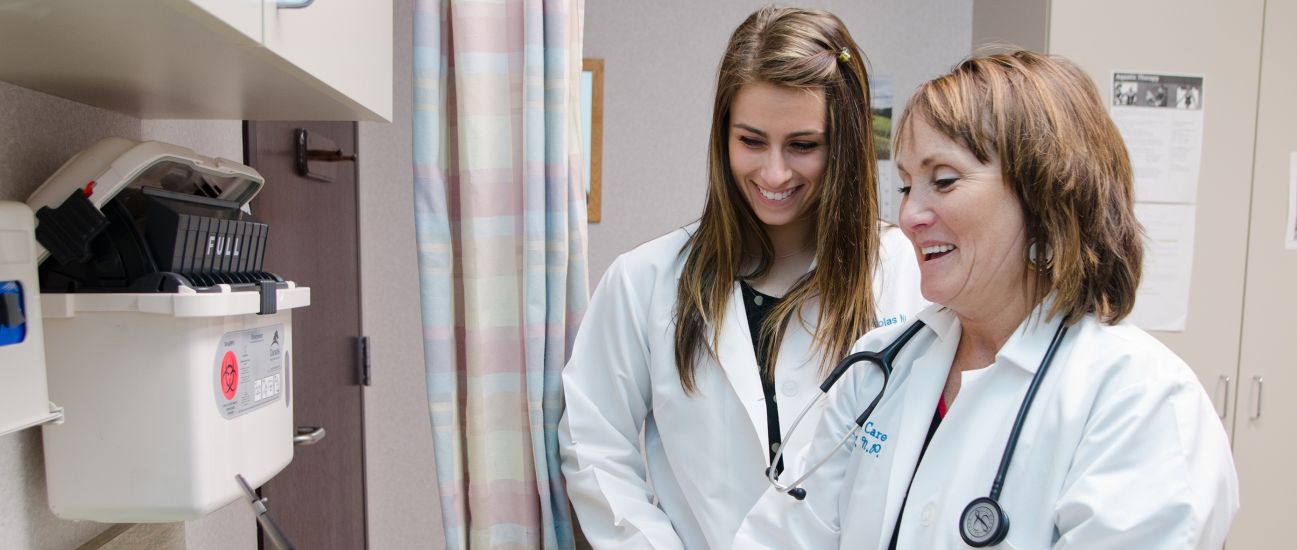Pre-Physician Assistant

As a pre-physician associate student, Carthage has numerous faculty/staff members to support your journey to professional school. Make sure you are working closely with your assigned faculty advisor to address any questions relating to your major or minor requirements. For questions regarding physician associate school requirements and preparation, please contact the science and pre-health career specialist in The Aspire Center.
See the pre-physician assistant timeline
These are the most common prerequisites for physician associate programs. However, different schools may have different prerequisites on what classes you should take. Make sure to check your desired program’s website.
- 2 General Chemistry Courses (CHM 1010 & 1020)
- 2 Introductory Biology Courses (BIO 1110 & 1120)
- 2 Organic Chemistry Courses (CHM 2070* & 2080)
- Microbiology (BIO 3340*)
- Biochemistry (CHM 3010*)
- Anatomy and Physiology (BIO 2010 and 2020 or BIO 3300 and 3310)*
- Introduction to Psychological Science (PYC 1500)
- Medical Terminology (BIO 400D)
- 1 Statistics Course
- 2 English Courses (COR 1200 and another course)
Other suggested courses
- Introduction to Sociology (SOC 1000)
- Genetics (BIO 2400*)
*= prerequisites needed for a course
You will need several letters of recommendation (3-4) for your application. While different schools may have different expectations for where your letters of recommendation should come from, it is usually expected to have 1-2 from a science course professor and 1-2 from a healthcare provider you have worked with or shadowed under.
Ideally, you should ask for a letter of recommendation at least 2-3 months in advance of your application deadline, although give as much time as possible. This way, they have adequate time to reflect upon their experience and write the best possible letter they can. If you are participating in an experiential role, it is suggested that you ask for a letter a month or two prior to the close of that experience.
While Carthage students usually apply to somewhere between eight and 12 schools, you can apply to as many schools as you would like. However, you should be aware that there is a financial commitment associated with application fees and the cost of submitting materials for review. As such, you should only apply to schools you would genuinely consider attending.
Applications will be submitted through the CASPA platform. If you plan on attending right after your undergraduate degree, you should apply in the summer of your junior year. It is recommended that you have all materials ready when the platform opens and submit them during late summer or early fall. Your application will be most competitive if you submit it before September 1. Below is the list of application materials.
- Personal statement
- Shadowing hours
- Healthcare experience hours
- Three or more letters of recommendation
- GRE scores
- Transcripts (official copy)
Preparing for professional school starts year one at Carthage, and we are here to help you each step of the way! We recommend that you reach out to your advising team as soon as possible regarding your plans so they can help you start preparing. Carthage also has many articulation agreements that can assist you in reaching your professional goals.
You should also join the Pre-Health Club at Carthage, which could help you foster connections with other pre-health students, understand your next steps, and deepen your experience with healthcare. Start building connections with professors now by getting involved and seeking out opportunities. It is also recommended you start looking for experiential learning opportunities and get involved.
